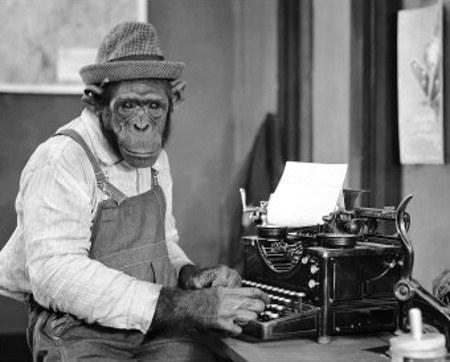Dr. Sarah Salviander posted a very interesting thread on Twitter that we have reproduced here, with permission. Each original tweet will be linked in parenthesis. Dr. Salviander also contributed Chapter 6 to the book The Story of the Cosmos: The Heavens Declare the Glory of God. You can support her work by buying the book here.
Why materialists need to stop using the monkeys on typewriters analogy and Christians need to stop worrying. Here’s Dawkins’ commentary on why people are compelled by the fine-tuning argument. Well, let’s engage in some consciousness-raising of our own about probabilities.
…I see no alternative but to dismiss it, while at the same time marvelling at the number of people who can’t see the problem and seem genuinely satisfied by the ‘Divine Knob-Twiddler’ argument.
Maybe the psychological reason for this amazing blindness has something to do with the fact that many people have not had their consciousness raised, as biologists have, by natural selection and its power to tame improbability.
(Link)
The monkeys-on-typewriters analogy is often used to explain how, given enough time and space, random processes can lead to extremely improbable events. But how much time and space are we talking about in the observable universe? Turns out, it’s surprisingly little. (link)
Let’s look at the probability of a large but finite number of monkeys randomly typing on keyboards happening to produce something intelligible. Say, the famous first line of Charles Dickens’ classic, A Tale of Two Cities: “It was the best of times, it was the worst of times.” (link)
Number of characters, ignoring punctuation = 50. Let’s ignore caps and all keys except for the letters and space bar. That’s 27 keys total. The odds of getting just the first two-letter word of the sentence = (1/27) x (1/27) = (1/27) to the power of 2 = 1 out of 729. (link)
Kind of low, but given a reasonable amount of time and monkeys, it seems possible. (More on this later.) What about the odds of getting the full first sentence? “It was the best of times, it was the worst of times.” With 50 characters, the odds become (1/27) to the power of 50. (link)
That works out to be approximately 1 out of 10 to the power of 71. Yikes. Let’s be generous and say we have a BILLION monkeys continuously typing away, and that they tap one key every second. How much time before we expect at least one of them to tap out the full sentence? (link)
(Math shorthand “e” = “10 to the power of.”) Monkeys typing = 1 billion = 1e9 Seconds in a year = 3.15e7 Total key taps per year = 1e9 x 3.15e7 = 3.15e16 = 31,500 trillion Sounds like a lot, but let’s see for how long our monkeys would need to type. (link)
Years of typing = 3.7e71 / 3.15e16 = 1.2e55 Given that the universe is 13.8 billion years old, it’d take a billion monkeys typing continuously for ~billion trillion trillion trillion lifetimes of the universe before we could expect to get just the first line of Dickens’ novel. (link)
So, what if we spread this experiment out over every possible planet in the observable universe, an estimated 1e21 planets. That’s not much help. It’d still take a trillion trillion lifetimes of the universe to produce just that one sentence. (link)
And that’s assuming you could get the monkeys to stay on task for any period of time, which turns out to be unreasonable. Someone actually tried this experiment with six monkeys and a keyboard, and after four weeks… (link) …not only did the monkeys fail to produce a single word of the English language, they got bored and started defecating on the keyboards. Perhaps an apt metaphor for the alleged blind, unguided processes that give rise to life in the universe. (link)
This thought experiment covered the expectation of randomly producing just one small intelligible string of information. Consider this in light of how vastly more complex the basic components of life are than one sentence from an English novel. (link)
This is why materialists have had to retreat to wildly speculative ideas to maintain their naturalistic models of life-producing universes. Billions of years sounded like a lot, but it’s not nearly enough. Billions of planets sounded like a lot, but it’s not nearly enough. (link)
What materialists need is an infinite universe or a de facto eternity, which they thought they had before the big bang messed it all up. They’ve been forced by the big bang to retreat to the only other form of eternity they can think of, which is the infinite multiverse. (link)
We’re left with either wild unscientific speculation about unknown mechanisms generating infinite universes – at which point, why not just put God back on the table? – or accepting the possibility that whatever is shaping the development of our universe isn’t unguided. (link)
Physicist and theologian Gerald Schroeder comments that it was this very discussion that finally pushed the late atheist Antony Flew away from atheism and toward belief in God. He didn’t have enough faith to be a materialist, and neither do I. (link)
You can learn more about Dr. Salviander at her website and her twitter










A new take is https://evo2.org Basically you need a coding system to arise spontaneously, like the DNA/Ribsome/Protein, but all the parts need to be there first for any to work.
But the probability argument was extended decades ago in a book by Coppedge, “Evolution, possible or impossible?”.
But one other problem with the monkeys is that it MUST ALREADY CONTAIN THE INFORMATION. How do you know when the monkeys have typed a word from english? You need a dictionary INSIDE to check. How do you know when the 50 letters have been typed? You have a copy to compare with.
And monkeys don’t live that long. So in the “primordial soup”, there was a very small supply, and the same energies which create the compounds would destroy anything built from them.
5
5
Sarah doesn’t discuss the indications by atheists’ own metrics that life got its start less than one billion years after the Big Bang.
Also related and of interest:
https://www.youtube.com/watch?v=r4sP1E1Jd_Y
James Tour: The Origin of Life Has Not Been Explained
( https://infogalactic.com/info/James_Tour )
Tour is awesome. We posted this video a few weeks ago, I think.
4.5
The argument of creation-from-chance is just as foolish today as it was in late republican Rome:
Must I not here express my wonder that any one should exist who persuades himself that there are certain solid and indivisible particles carried along by their own impulse and weight, and that a universe so beautiful and so admirably arrayed is formed from the accidental concourse of those particles? I do not understand why the man who supposes that to have been possible should not also think that if a countless number of the forms of the one and twenty letters, whether in gold or any other material, were to be thrown somewhere, it would be possible, when they had been shaken out upon the ground, for the annals of Ennius to result from them so as to be able to be read consecutively,—a miracle of chance which I incline to think would be impossible even in the case of a single verse.
— Marcus Tullius Cicero, “On the Nature of the Gods” II/37 https://oll.libertyfund.org/titles/cicero-on-the-nature-of-the-gods
—
The reason why Sarah Salviander completely fails to address Dawkin’s claim can be found in Dawkins’ final words from the quote: “by natural selection and its power to tame improbability.”
Salviander’s monkeys-writing-Dickens experiment FAILS to employ any mechanism of “natural selection”, and thus FAILS “to tame improbability.” This renders her argument a complete strawman.
That a ‘pure’ monkeys-on-typwriters experiment generates low probabilities is hardly news, and this is why it is generally referred to as the “INFINITE monkey theorem”.
“Years of typing = 3.7e71 / 3.15e16 = 1.2e55 Given that the universe is 13.8 billion years old, it’d take a billion monkeys typing continuously for ~billion trillion trillion trillion lifetimes of the universe before we could expect to get just the first line of Dickens’ novel.”
Yeah, it’s gonna take a bit more than hand waving your invalid assertion of magical “power to tame improbability”.
I’m afraid the point of my gedanken experiment has eluded you, in spite of your reassertion of it. The monkeys-on-typewriters thought experiment fails no matter from which direction you approach it – as you and Dawkins both point out, without some kind of intervening mechanism to “tame” the improbabilities, we’re left with absurd improbabilities that random, unguided processes cannot hope to mitigate in any reasonable amount of time. Whether you believe natural selection is a plausible mechanism or not, the point of this exercise is to show the absurdity of the analogy.
So, is natural selection a plausible mechanism to overcome the kind of improbabilities we’re discussing? I invite you to explain with precision how this would work in terms of the mathematics. The steps in the natural selection process are:
1. Variation
2. Differential reproduction
3. Heredity
Let’s consider the example physicist Gerald Schroeder uses in Chapter 7 of his book, The Science of God. He estimates life is constructed out of 2e12 different proteins. Now, if we consider a model protein 300 amino acids in length, and given that there are 20 amino acids, the number of possible combinations of these amino acids in a chain of that length is 20^300, twenty to the power of 300, or 1e390 in the notation I use above. Remember, only 2e12 (1e12.3) combinations out of the 1e390 possible combinations produce life. I can accept going from step 2 to step 3 if you can explain to me very precisely the natural mechanism that moves us from step 1 to step 2 in a reasonable amount of time given that we need to select for 1e12.3 combinations out of 1e390 possible combinations.
The monkeys not only have to type Shakespeare, they have to build the typewriters. And smelt the ore to make the iron to forge into typewriter parts.
Given observable rates of mutation in existing species, not enough time has elapsed in the history of the universe to go from early reptiles to any modern mammalian species, let alone for blue-green algae. Natural Selection does not “tame improbability”. Natural Selection is a handwave where the evolutionist essentially declares “magic happens and then species.”
If you’re in a discussion here and you don’t see the midwit commenting, you’re the midwit.